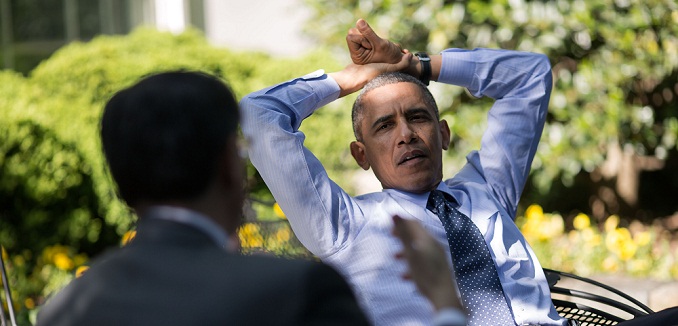In a stinging public rebuke, a trio of leading foreign policy officials for the Clinton, Bush, and Obama administrations — including two who served as key Obama White House officials overseeing U.S. policy on Iran — have leveled an unusually blunt assessment of recent U.S. foreign policy setbacks related to the Islamic Republic, charging that “the stalemate over nukes, and now a Tehran-backed coup in Yemen, show that Obama isn’t tough enough.”
Writing in Politico former White House and State Department official Dennis Ross, former undersecretary of defense Eric Edelman, and former Obama NSC advisor Ray Takeyh argued that the White House’s current tactics to stop Iran’s growing regional influence, military expansionism and nuclear development are failing and called for President Obama to take a much stronger approach against the Islamic Republic.
During the course of the nuclear negotiations over the past year, Iran has been the beneficiary of a generous catalogue of concessions from the West. The [Western nations] has conceded to Iranian enrichment, agreed that Tehran need not scale back the number of its centrifuges significantly or dismantle any facilities and could have an industrial-size program after passage of a period of time. The Iranians have, during the course of the ten years of negotiations, grown accustomed to having their interlocutors return to the table with concessions meant to meet their mandates while offering only limited compromises of their own.
Despite that no agreement was achieved at the end of the one year time-frame of the Joint Plan of Action—and the Supreme Leader Ali Khamenei continues to signal that Iran can live without an agreement. In fact, his negotiators are pressing for more concessions while not offering any of their own.
Hence it is time to acknowledge that we need a revamped coercive strategy, one that threatens what the Islamic Republic values the most—its influence in the Middle East and its standing at home. And the pattern of concessions at the negotiating table must stop if there is to be an acceptable agreement. Iranian officials must come to understand that there will be no further concessions to reach an accord and that time is running out for negotiations.
The former officials explain that Iran in the past has changed its policies “only when its leaders saw high costs in not doing so,” and so the United States must work to change the balance of power in Iran-backed Syria, cooperate with Gulf allies to isolate Iran regionally through naval maneuvers in the Persian Gulf, and even “consider a political warfare campaign” by publicizing Iran’s political and human rights violations as well as “all the concessions that [Western nations] have made and how little Iran has moved.”
Ross, Edelman, and Takeyh — who during his time in the Obama White House actually authored President Obama’s letters to the Supreme Leader of the Islamic Republic — concluded by noting that a “unified domestic American front” will be crucial to achieving American strategic aims in the region, but noted that this will only be possible with continued engagement and “sincere dialogue” with Congressional leaders to ensure that any deal will survive beyond the end of President Obama’s tenure.
This week, Iranian backed extremists exported the Iranian revolution to Yemen, toppling an American allied regime and extending the control of the Islamic Republic of Iran’s Shiite clerical Empire to a fourth Arab state, including the country’s port and airport.
In Replacement Theory: The Administration’s Crazy New Middle East Illusion, which was published in the December 2014 issue of The Tower Magazine, David Daoud argues that current American strategy in the Middle East is emboldening the Islamic Republic’s most aggressive and anti-Western tendencies:
For the Islamic revolutionaries and clerical dictators running the country, this new approach is a welcome change from decades of American efforts to sideline Iran. But Tehran is receptive to Washington’s changes for entirely different reasons. Seizing on what it sees as American weakness under this administration, Tehran believes it can break free of the diplomatic and economic sanctions that have crippled its economy, and freeze Western efforts to stall its regional ambitions. A nuclear deal in Iran’s favor may be with in its grasp, Tehran believes. And they may not even need to make such an agreement, if simply by negotiating with the West they can resurrect their economy and stall any U.S. action against their takeover of Syria, Iraq, and Yemen, removing further obstacles to their regional hegemony.
And it is here, in Iran’s very different view of a possible rapprochement with the United States, that the real danger to regional and American interests lies. Contrary to the expectations of many U.S. policymakers, giving Iran free rein in the Middle East would not be a major diplomatic victory, but a strategic nightmare. Replacing the putative caliphate of the Islamic State with the brutal Imamate of the Islamic Republic, the IRGC, Hezbollah and the rest of Iran’s regional proxies, would be a strategic and moral catastrophe.
[Photo:White House ]




